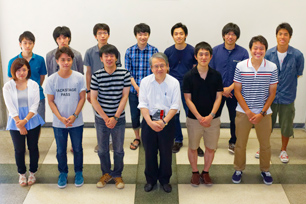Asobu Yanagisawa, Professor, Faculty of Economics
A Seminar Class Studying the Model of Modern Japanese History—Working Hard and Having Fun in Their Youth
Focusing on aspects of postwar Japanese society and economics, this seminar investigates all sides of the Japanese economic miracle

In Japan's period of rapid growth, factories sprung up even in the cities, the bustle in the shopping streets continued until the small hours, while in the back alleys children amused themselves playing games that cost no money. Adults too, had their pleasures in the air-conditioned movie theaters and department stores. Of course, in this period of rapid economic growth, there were different kinds of hardships to those we face today. Fighting among the children was never-ending, and the disabled soldiers who came back from the war would line up and board the trains. These were kinds of scenes people would see as they continued working, distracting themselves and healing the wounds of war.
In my seminar, with the economic miracle as the underlying theme, everyone, including myself, takes part as students work towards their Mita Festival presentations and their graduation theses. The third-year students choose truly sophisticated and insightful subjects, such as women's magazines during the occupation years, business activities at dry-cleaners, rice dealers, negotiation of fishing rights between Japan and the Soviet Union, relations between Vietnam and Japan, and the popularity of the cassette tape, and they devote all their energy to collecting materials to prepare for their Mita Festival essays and develop their dissertations. The locations for collecting information vary from the fourth floor basement of our library, the National Diet Library, the Tokyo Metropolitan Library, and interviews at shops, and at a camp in September students bring their research results thus far to open it up to heated discussions with their peers and students from other universities. The students expand their view, to see various incidents that are not found in textbooks in three dimensions, from the popularity of jazz music, the student movements of the 1960s, and the post-Olympic economic depression. Piecing together fragments of the lifestyles, work-life and diversions of regular people from that era, students re-question post-war Japan and the economic miracle from many sides.
The students in my seminar are always busy collecting materials, reading and discussing texts together, and for the students it is equal parts struggle and enjoyment. The third-year students who complete their unique works in November are overcome with a sense of accomplishment, and once their graduation research comes to fruition at the graduation thesis report briefings in February, they say that they have no regrets from their two years in the Yanagisawa's seminar.
Student’s Voices
Narifumi Yoshihiro
Third-year Student, Faculty of Economics
Hooked on Economic History
In Professor Yanagisawa's seminar—which has a 20-year history—we explore a wide range of themes from the perspective of economic history, starting with phenomena in Japanese economics and society at the start and end of the period of Japan's rapid economic growth. Over the two years we put a lot of effort into writing papers, as every single student submits a paper for the Mita Festival or proactively applies to essay contests like the Duncan Clark Hyde Awards. For us the completion of the Mita Festival paper and graduation thesis is always kept in sight. Through a series of discussions with Professor Yanagisawa and with other members of the seminar on how to delve into innovative themes of our interests, we are making progress in our research while every day we improve our skills in critical reading and discussion, essay writing, and bibliographic surveys.
The number of people in the seminar is by no means large, and our professor is aiming for considerateness and that everyone in the seminar respects each other’s personal lives—or as he says, "Scholarship that is thoroughly human." So although the atmosphere of the seminar is quite rigid, there is a harmony that shines through.
*Position titles, etc., are those at the time of publishing.
